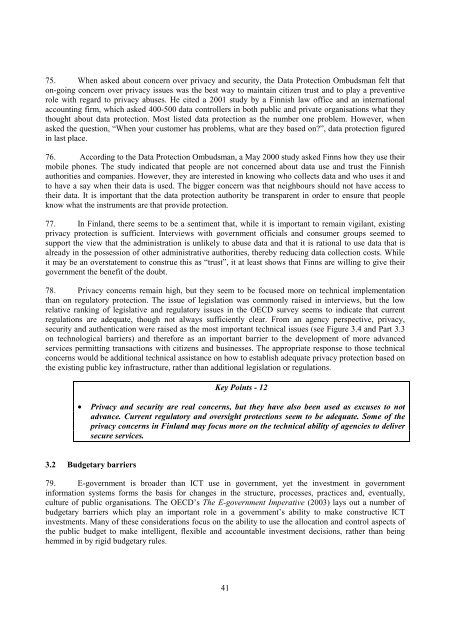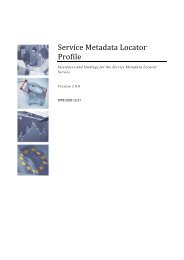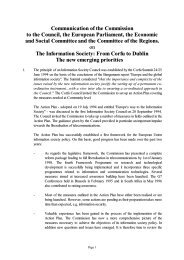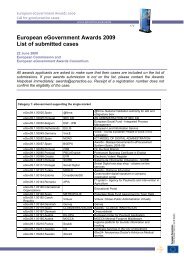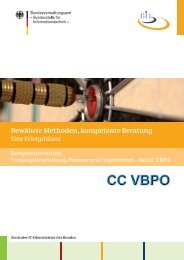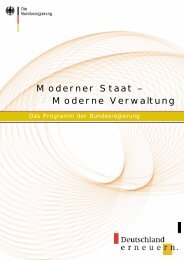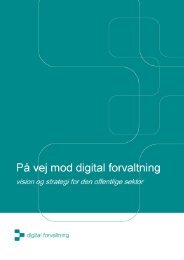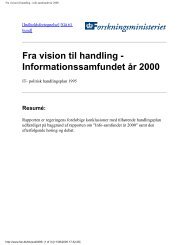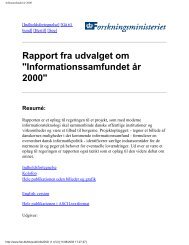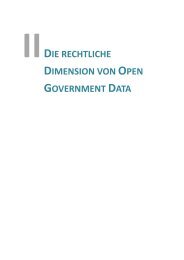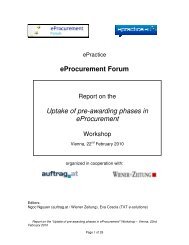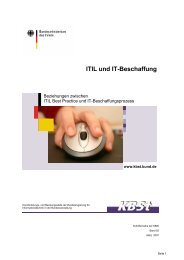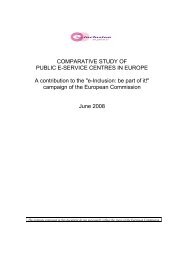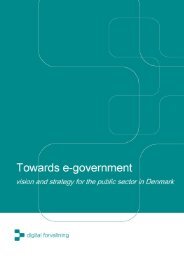e-GOVERNMENT IN FINLAND - ePractice.eu
e-GOVERNMENT IN FINLAND - ePractice.eu
e-GOVERNMENT IN FINLAND - ePractice.eu
Create successful ePaper yourself
Turn your PDF publications into a flip-book with our unique Google optimized e-Paper software.
75. When asked about concern over privacy and security, the Data Protection Ombudsman felt that<br />
on-going concern over privacy issues was the best way to maintain citizen trust and to play a preventive<br />
role with regard to privacy abuses. He cited a 2001 study by a Finnish law office and an international<br />
accounting firm, which asked 400-500 data controllers in both public and private organisations what they<br />
thought about data protection. Most listed data protection as the number one problem. However, when<br />
asked the question, “When your customer has problems, what are they based on?”, data protection figured<br />
in last place.<br />
76. According to the Data Protection Ombudsman, a May 2000 study asked Finns how they use their<br />
mobile phones. The study indicated that people are not concerned about data use and trust the Finnish<br />
authorities and companies. However, they are interested in knowing who collects data and who uses it and<br />
to have a say when their data is used. The bigger concern was that neighbours should not have access to<br />
their data. It is important that the data protection authority be transparent in order to ensure that people<br />
know what the instruments are that provide protection.<br />
77. In Finland, there seems to be a sentiment that, while it is important to remain vigilant, existing<br />
privacy protection is sufficient. Interviews with government officials and consumer groups seemed to<br />
support the view that the administration is unlikely to abuse data and that it is rational to use data that is<br />
already in the possession of other administrative authorities, thereby reducing data collection costs. While<br />
it may be an overstatement to construe this as “trust”, it at least shows that Finns are willing to give their<br />
government the benefit of the doubt.<br />
78. Privacy concerns remain high, but they seem to be focused more on technical implementation<br />
than on regulatory protection. The issue of legislation was commonly raised in interviews, but the low<br />
relative ranking of legislative and regulatory issues in the OECD survey seems to indicate that current<br />
regulations are adequate, though not always sufficiently clear. From an agency perspective, privacy,<br />
security and authentication were raised as the most important technical issues (see Figure 3.4 and Part 3.3<br />
on technological barriers) and therefore as an important barrier to the development of more advanced<br />
services permitting transactions with citizens and businesses. The appropriate response to those technical<br />
concerns would be additional technical assistance on how to establish adequate privacy protection based on<br />
the existing public key infrastructure, rather than additional legislation or regulations.<br />
Key Points - 12<br />
x Privacy and security are real concerns, but they have also been used as excuses to not<br />
advance. Current regulatory and oversight protections seem to be adequate. Some of the<br />
privacy concerns in Finland may focus more on the technical ability of agencies to deliver<br />
secure services.<br />
3.2 Budgetary barriers<br />
79. E-government is broader than ICT use in government, yet the investment in government<br />
information systems forms the basis for changes in the structure, processes, practices and, eventually,<br />
culture of public organisations. The OECD’s The E-government Imperative (2003) lays out a number of<br />
budgetary barriers which play an important role in a government’s ability to make constructive ICT<br />
investments. Many of these considerations focus on the ability to use the allocation and control aspects of<br />
the public budget to make intelligent, flexible and accountable investment decisions, rather than being<br />
hemmed in by rigid budgetary rules.<br />
41


